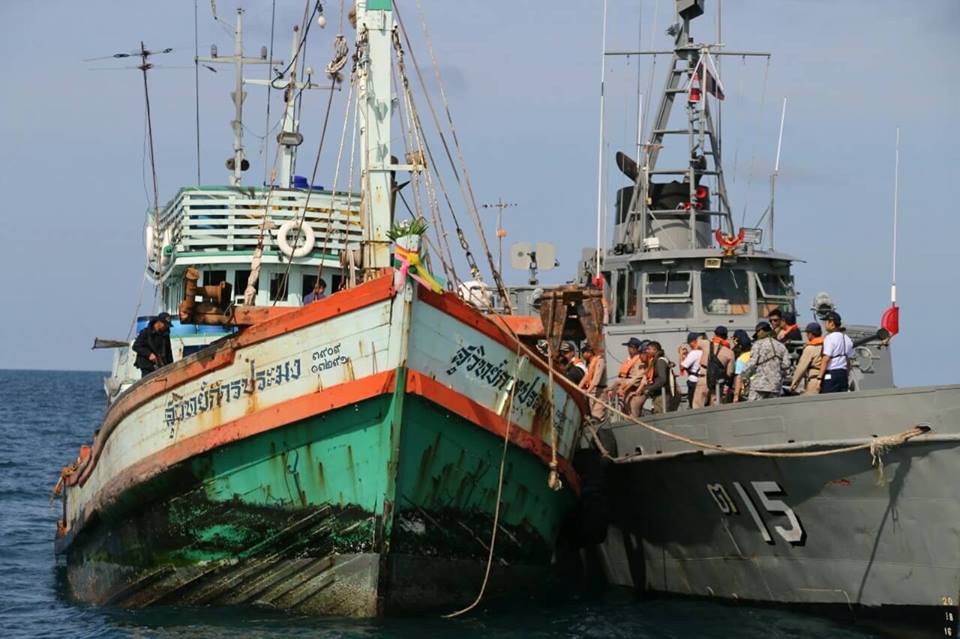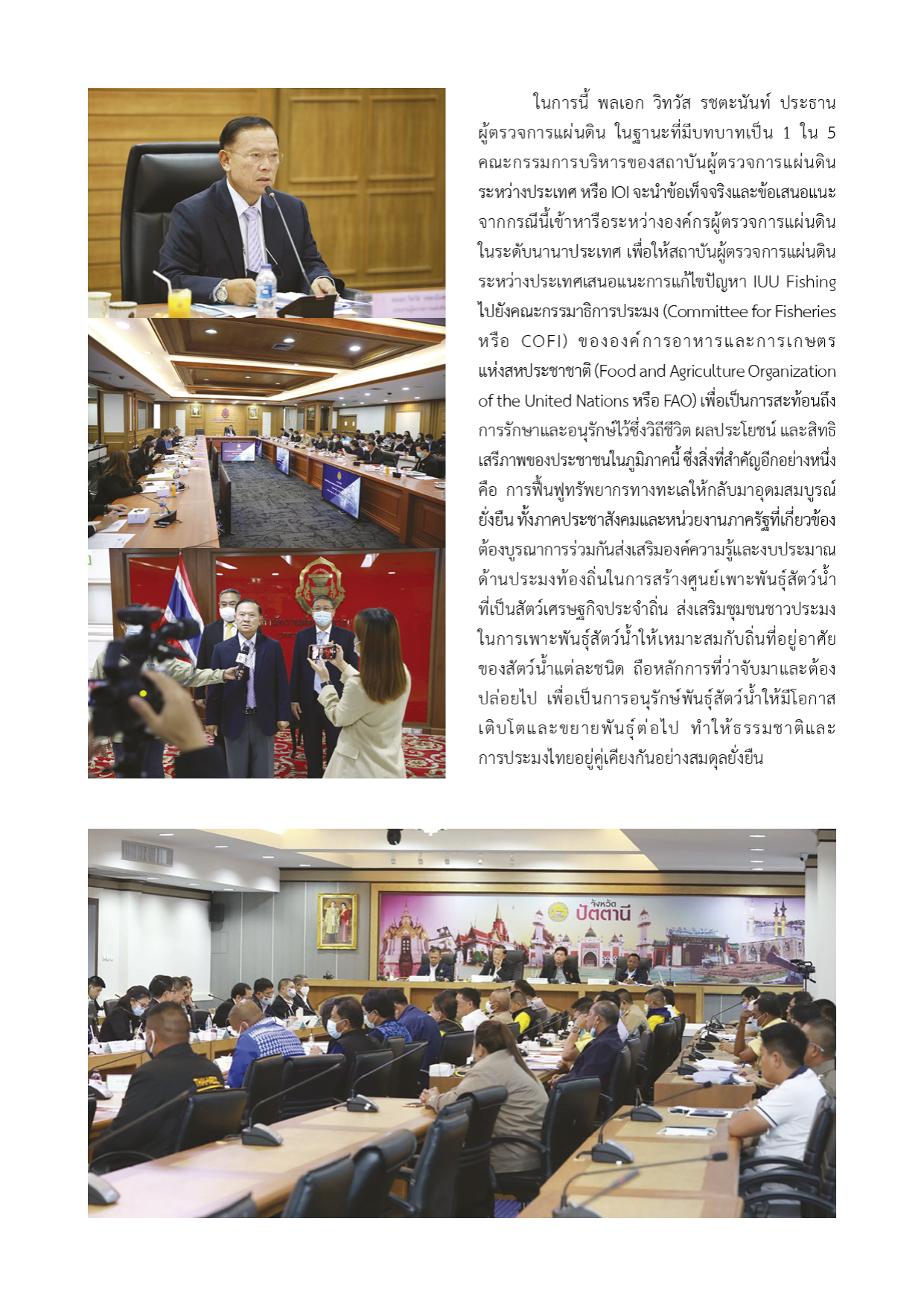

Ombudsman works out the solutions to the illegal, unreported and unregulated (IUU)
fishing in Thailand
Fishery is one of the agricultural occupations that has enormously contributed high income for Thailand. However, there are illegal fishing taking place and causing problems at national level.
The Ombudsman acknowledged and initiated his own-motion investigation into these ongoing problems, in order to holistically find out obstacles and impacts of fishing under the fisheries law at national level. It was found that many of issues were caused by the enactment of national fishing laws or regulations to comply with the illegal, unreported and unregulated (IUU) fishing regulations, after the receipt of official warning or so-called “yellow card” from the European Union (EU) in 2015. Even though the Thai government has tackled the problem by reforming Thai fishing industry to ensure the greater sustainability, it might have been inconsistent with the means of artisanal and commercial fisheries.
On that occasion, General Viddhavat Rajatanun, Chief Ombudsman, Mr. Somsak Suwansujarit, Ombudsman as well as the Office of the Ombudsman’s officers carried out on-site fact finding at the fishing areas in the southern region, Songkhla and Pattani provinces. The notable fishing industry in Pattani province, in particular is currently very slow. The Fisheries Association of Pattani province revealed that in 2015, there was more than 1,100 fishing vessels entered and exited in coastal waters of Pattani, but the number of vessels dropped to only 437 in October 2020 – February 2021. As a knock-on effect, this decrease affected the related offshore and onshore entrepreneurs e.g. fish merchants, ice factories, fish cold storages, shipyards and machine shops. The main problems can be concluded as follows:
1) Limits on the number of fishing days – According to measure of the Department of Fisheries, commercial fishing by trawlers in the gulf of Thailand has been permitted for 240 days per year, while fishermen have to pay monthly wages for workers for a whole year or 365 days. Currently, the Department of Fisheries is working to amend its announcement to permit additional fishing days. In addition, as most of the workers in the fishing industry are low-paid migrant workers, they prefer to be paid in cash rather than payment through the accounts or electronic payments.
2) The shortage of workers in fishing industry – Since the migrant workers employment involves the lengthy processes including 100 working days approximately for granting work permit and non-Thai identification card. Furthermore, expenses, charging to migrant workers for license fees (around 19,000 baht), and for passport (around 5,000 – 10,000 baht) have become the financial burden falling on the employers. The Fisheries Association of Pattani province, therefore, requested all-year migrant workers registration. At present, the Department of Fisheries proceeds to consider the amendments of the law to ease the practical guidelines.
3) Law enforcement and its impacts on economy and society – There are transgressing fishermen and fishing entrepreneurs who unknowingly break the rules or commit minor wrongdoing,
for example, making errors in the filled documents. The appropriate penalties or just deserts should be considered in order to allow them to continue their occupation. Besides, the on-site fact-finding also found the recurring problem of dredging watercourse in Pattani province, purchasing illegal fishing vessels without fishing licenses and registrars, and the rapid degradation of marine resources.
General Viddhavat Rajatanun, Chief Ombudsman, attended a meeting among the representatives from relevant agencies including Mr. Vicharn Ingsrisawang, Deputy Director General of the Department of Fisheries, Mr. Somchai Sumanuskajonkul, Deputy Director General of Marine Department, Vice Admiral Montri Rodwiset, Deputy Director General of Thai Maritime Enforcement Command Center (Thai-MECC), Mr. Weerapan Thongmark, Director of Marine Resources Rehabilitation Subdivision, Department of Marine and Coastal Resources, Mr. Montri Maneerat, Specialist on Labour Protection, Department of Labour Protection and Welfare, as well as
Mr. Kamjon Mongkoltrilak, President of National Fisheries Association of Thailand. The objective of the meeting was to mutually discuss the problems, and find out problems, obstacles, and impacts of fishing in Thailand. This meeting will lead to the preparation for the amendment made to laws, rules and regulations, causing undue burden on the people in fishing industry in Thailand, to be in line with the real practice to enhance the sustainable fishing management.
In this regard, General Viddhavat Rajatanun, Chief Ombudsman, as one of the Executive Committee of the International Ombudsman Institute (IOI), will bring the facts and recommendations of this case up for discussion among the international Ombudsman organizations, so that the IOI will push forward the recommend to solve IUU fishing to the Committee on Fisheries (COFI) of the Food and Agriculture Organization (FAO) of the United Nations, in order to preserve the way of life, secure the benefits, freedom and rights of people in this region. Another important objective is to strengthen fishery and marine resources rehabilitation by cooperation and integration efforts from public and private sectors to provide know-how and to grant budget for expanding the coastal aquaculture centers. The centers will play an important role to educate and raise the local fishermen’s awareness of endemic/native aquatic species conservation on the basis of catch-and-release fishing. This approach will conjointly nurture the ecosystem and consolidate Thailand’s sustainable fishery in a balance way.

